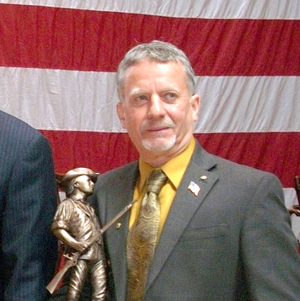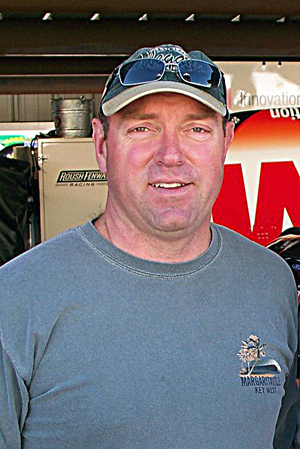 |
| Dan Zahno says his experience makes him more qualified. |
 |
| Local 264 Union President
Brian Dickman is ready to marshal
union support for Zahno. |
 |
| Supervisor Dennis Brochey
may make the final call and he
says his call is going to be
Zahno. |
 |
| Mike Townsend was chosen for
the job by the town board. |
|
|
|
|
|
Lewiston NY- An employment conflict has arisen over who will be Water Maintenance Foreman #2 – the top union position, and the person in charge of the operating system, for the Town of Lewiston Water Department.
The job was recently vacated with the retirement of longtime foreman Robert Nablo.
Michael Townsend, 51 and Daniel Zahno, 40, both town employees and members of Teamsters Local 264, the union which represents employees of the Water and Highway & Drainage Departments of the town, are vying for the position.
Both men have the required Water Operator Certification from the New York State Department of Health to operate Lewiston’s water system.
Townsend was chosen by the town board in part because of seniority. He has been employed by the town for 28 years, spending about 24 years with the Water Department before transferring to the Highway Department in 2010.
Zahno has spent his entire 16 years with the town at the Water Department.
Townsend assumed the Water Maintenance Foreman position last Friday, May 29, leaving behind his post at the town Highway Department.
Under the collective bargaining agreement between the union and the town, Townsend’s hire is probationary for six months.
Zahno, who presently works for the water department as a wastewater maintenance #1, has filed a grievance with the union arguing that Townsend’s appointment was improper since he, Zahno, has superior qualifications which trumps seniority, according to the collective bargaining agreement.
Zahno, a union steward, is one of four bargaining unit signatories who signed the agreement on behalf of the union.
Local 264 Union President Brian C. Dickman, Secretary Treasurer Darrin C. Ziemba, and Business Agent Mark W. Boling have gone on record supporting Zahno, saying, despite apparently similar qualifications, Zahno is more qualified than Townsend and should have been selected.
“They are not equal,” Boling said. “Zahno has done the job. Townsend in, at least the past five years, has not done the job.”
Zahno had been running the Water Department for weeks following Nablo’s retirement last month and up until last week when Townsend assumed the position.
Also supporting Zahno’s position is Town Supervisor Dennis J. Brochey, who is designated by town law as superintendent of the water department.
Brochey and Zahno are personal friends and Brochey named Zahno as his successor as president of the Niagara Powerlifting Club that Brochey founded.
Both Brochey and Zahno set US powerlifting records for their age class.
“Dan and I are friends, sure,” Brochey said, “But at a time like this, friendship has nothing to do with the fact that Dan Zahno is better qualified for the job. He has the experience.”
On Townsend’s side are four of five Lewiston Town Board members, Robert Conrad, Beth Ceretto, Ronald Winkley and Alfonso M. Bax - who voted to appoint Townsend last month after Nablo retired.
The board claims Townsend has equal if not greater qualifications, seniority, and that the board has discretion in determining which candidate is better or equally qualified.
Townsend is the son of prominent and influential Republican, Gary Townsend, a realtor, business owner, merchant, historian, and former president of the 400 member Sanborn Historical Society.
The society developed the Sanborn-Lewiston Farm Museum with the Gary W. Townsend Hall. His son Michael, in addition to his work at the town, has been active in working with his well known father.
As this battle over the right to the Water Department job proceeds through grievance and possibly to court, both Townsend and Zahno are likely to cite the same section of the collective bargaining agreement, 5.2.1: “In the event there is a vacancy in a new or existing job title, the Town shall select the most qualified applicant. In the event there are two or more applicants with relatively equal qualifications, seniority shall be the deciding factor.”
Brochey, as the representative for the town in the grievance process, says he believes he is authorized to settle the grievance by appointing Zahno to the position when he hears the grievance. The union agrees.
“We don’t want to argue our case in the media,” said Local 264’s Ziemba, “(but) there is no legislative review” of the grievance process.
If Zahno was appointed, according to the bargaining agreement, Townsend would be reinstated to his previous position in the highway department.
The town board could challenge Brochey’s assertion that he can unilaterally settle a union grievance that contradicts an earlier town board decision.
Nablo, who worked nearly four decades for the town when he retired as water maintenance foreman #2, wrote a letter, dated May 23, advising the town that, during the last several years, during his absences on vacation or sick leave, Zahno supervised the water department as the “responsible person in charge”.
Nablo wrote that Zahno earned a notation in his personnel file for performing the job in a satisfactory manner, which, according to chapter 7.4.1 of the collective bargaining agreement, “shall be given consideration” in choosing who is best qualified for the position.
“Dan would be the best choice to take over my vacated position because of his knowledge, commitment and dedication to the town of Lewiston,” Nablo wrote.
If the Town Board successfully challenges Brochey’s plan to settle the union grievance in favor of Zahno, the union has an option of taking the matter to arbitration where an arbitrator, selected through mutual agreement or through a process of alternate elimination of a panel of arbitrators, will decide whether there has been a violation, misinterpretation or misapplication of the specific provisions of this Collective Bargaining Agreement.
At the end of the day, the question of seniority will be weighed against the question of whether there was a substantive difference in the qualifications of the candidates at the time of the board’s appointment of Townsend.





